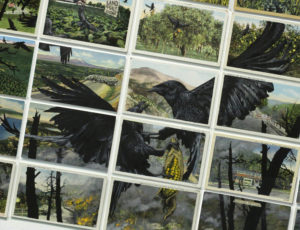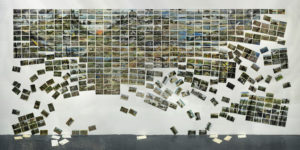At a certain distance, David Opdyke’s upcoming exhibition at the University of Michigan Institute for the Humanities could be mistaken for the idyllic Americana invoked by the National Anthem.
More Info
- Jan. 25, 4 p.m.: Good Intentions: Is Art an Effective Means of Activism?
- Feb. 4, 1-2 p.m.: LOOK 101: Seeing Art in an Instagram World: How to Look at the Art of David Opdyke
- Feb. 22, 1-2 p.m.: In Conversation: Artist David Opdyke with Writer Lawrence Weschler
Take a few steps forward, and a more complex picture emerges: a land of great natural beauty beset by environmental chaos and political turmoil.

David Opdyke, This Land, wall mural of vintage postcards modified with gouache and ink, which is part of the exhibition “David Opdyke: Paved with Good Intentions” on view at the U-M Institute for the Humanities Gallery Jan. 25–Feb. 27.
Opening Jan. 25, “David Opdyke: Paved with Good Intentions,” is a continuation of his previous work, featuring a site-specific installation that serves as a critique of U.S. culture and politics.
Opdyke has hand-painted sinister—and darkly comic—new images onto 528 vintage postcards of well-known American landmarks and destinations. The postcards are assembled into a large mural—a vast gridded landscape beset by modern symptoms of disorder.
The exhibition also features animated shorts and script-driven video, which take place within the visual confines of one or more postcards. The animation is inspired, in part, by Terry Gilliam’s animation work on Monty Python’s “Flying Circus” and by the classical music sound effects in the Road Runner cartoons.

David Opdyke, This Land, wall mural of vintage postcards modified with gouache and ink, which is part of the exhibition “David Opdyke: Paved with Good Intentions” on view at the U-M Institute for the Humanities Gallery Jan. 25–Feb. 27.
“David Opdyke’s work is a wake up call referencing the impacts of global warming, assaults to the environment and humanity, and a reality that includes the seemingly constant threat of catastrophe,” said Amanda Krugliak, curator and assistant director for arts programming at the Institute for the Humanities. “But beyond cynicism and anxiety, his work speaks to commitment and perseverance. There is a deliberateness and deep investment in his repainting each post card.”
The U-M Institute for the Humanities Gallery is located at 202 S. Thayer St. in Ann Arbor. The exhibition is free and open to the public. Gallery hours are 9 a.m.-5 p.m. weekdays.
This project is supported by a grant from the Efroymson Family Fund.


